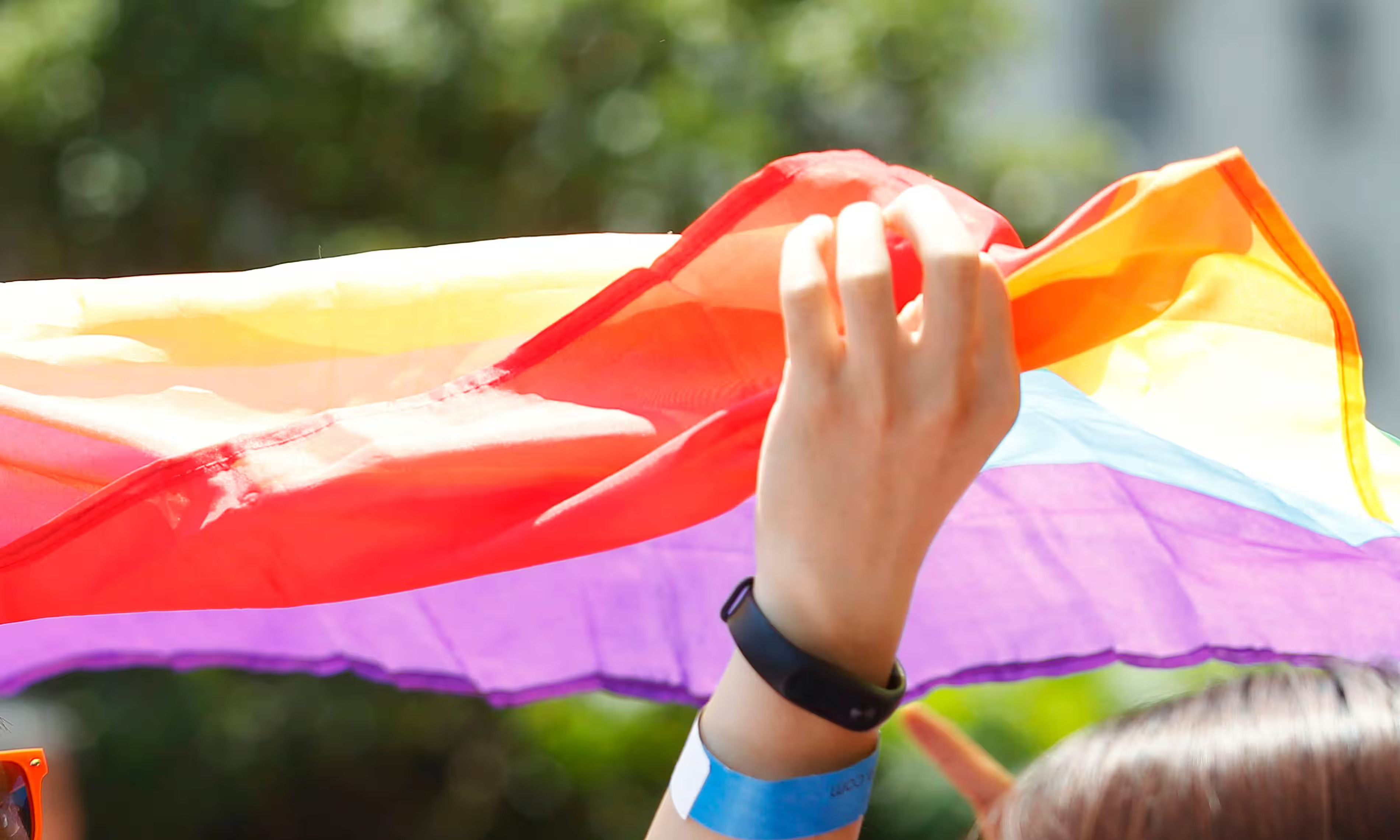Over the last three decades, LGBTQ+ issues have seen a great deal of push and pull in China.
On the side of progress, there was the 1997 abolishment of an anti-hooliganism law often used to target gay men, and in 2001, the removal of homosexuality from the Chinese Society of Psychiatry’s list of mental disorders. In 2019, due to the persistence of advocates and allies around the country, it was reported that a referendum to introduce same-sex marriage into China’s civil code was up for discussion at this year’s Two Sessions meeting.
Related:
 Is China Legalizing Same-Sex Marriage?Officials have acknowledged a stream of output from the country’s citizens urging lawmakers to legalize same-sex marriage in a new civil codeArticle Dec 21, 2019
Is China Legalizing Same-Sex Marriage?Officials have acknowledged a stream of output from the country’s citizens urging lawmakers to legalize same-sex marriage in a new civil codeArticle Dec 21, 2019
But these discussions were eventually dismissed as the Two Sessions came and went. Moreover, Chinese microblogging platform Weibo attempted to ban “homosexual content” as recently as 2018 (though they reversed the decision after considerable backlash), while LGBTQ+ representation in mainstream media remains extremely limited at best — last year, for example, Bohemian Rhapsody was released in Chinese cinemas with all references to Freddie Mercury’s sexuality removed.
Major cities may have thriving queer communities — and a recent survey of college students showed 15% identifying as LGBTQ+ with another 6% questioning their identity — yet other surveys have consistently shown that less than 20% of queer-identifying people have told their parents.
Within this ever-shifting context, a handful of queer film festivals in China have become quiet advocates for progress through screenings and discussions relevant to the queer community.
Proceeding with Caution
While some advocacy groups focus on bringing legal recognition to the table, there remains the task of building awareness, education, and discussion both within and outside of the community. This is the objective of queer film festivals anywhere. In China’s case, though, such organizations exist in grey areas that leave them in a vulnerable position: not directly banned or oppressed, but with no real safeguards, either.
The longest running of China’s film festivals takes place yearly in the capital city of Beijing. Founded in 2001 by filmmaker and professor Cui Zi’en, Beijing Queer Film Festival (BJQFF) has faced many hurdles over the years — 2013 was the first year totally without government interference. Though organizers say they have had less direct obstruction in recent years, operating in the capital remains sensitive; as the city has seen “more political activity” lately, they have opted to keep their events “as low-key as possible.”
In the eastern city of Shanghai, the annual ShanghaiPRIDE event has held small-scale film screenings since its beginning; by 2015, this became its own annual event, ShanghaiPRIDE Film Festival (ShPFF). Film-focused collective CINEMQ, which for two years helped build an audience for ShPFF, split off in 2017 and continues to hold regular screenings at venues around the city. Meanwhile, Shanghai Queer Film Festival (SHQFF) began as an independent organization in 2016 and held its first annual festival a year later.
An organizer of Guangzhou International LGBT Film Festival declined to comment for this article. The festival has been around since 2015, and is jointly hosted by various foreign consulates.
Interviewees all reported healthy communities and events and spoke with optimism about the future of queer acceptance in China. However, the fact remains that queer organizations generally are, if not necessarily forbidden, still without legal protections.
One result of occupying this grey area can be a reticence to engage with authority. A seemingly mundane limitation is that gatherings above a certain size need to be reported ahead of time — the number varies from city to city. While this might not be an obstacle for many kinds of events, it is for queer film screenings that would prefer to avoid unwanted attention. Thus, although the festivals have huge potential for growth in their respective metropolitan areas, some reported an unwillingness to engage with local officials unless absolutely necessary, preferring to hold smaller events and fly under the radar.
Ting, director of SHQFF, says:
“In China, a lot of the time there is no certain rule. Everything is kind of vague. There is a bar and you’re trying to touch it, and sometimes not touch it, and sometimes you don’t know you’re touching it until you’re talked to by some people.”
As such, they’ve had to take a stoic approach to occasional venue cancellations. ShPFF has had venue owners cancel due to “unforeseen circumstances” — a term commonly used to explain away cancellations that may or may not involve pressure from local officials. SHQFF and BJQFF reported similar situations. Potential for last-minute switch-ups forces organizations to always have backup venues, though over the years they have developed stronger working relationships with queer-friendly locations.
Content poses another potential legal issue. Among other things, China’s ban on nudity in film can be a challenge for queer cinema, says Matthew Baren, one of the founders of CINEMQ. “But we see it as a creative challenge, rather than as a block,” he said. “There are still plenty of interesting ways to explore queerness within these limits.”
Although Wang Xiao of BJQFF admitted that explicitly queer content would be unlikely to pass censors if it came to an actual check, he noted that they have never had their content checked before. “I’m inclined to not do a content check ourselves,” he says. “Film shouldn’t be restrained, it should allow the creator’s free expression.”
Creating Community
How much community can queer film events in China even build with these kinds of limitations? With understandable hesitations about crossing an invisible line, it seems that the consensus is to remain small-scale for the time being. One organizer mentioned an event that brought in close to 300 attendees, but ruefully remembers it as “packed and dangerous.” Most events are now held in venues that limit the audience to between 60 and 80 people, at maximum 100.
On this front, everyone is eager to put safety first. Baren affirms, “The security of our audience and our team is of primary importance.”
With these self-conscious limits in place, there isn’t as much of a push to reach the wider public, but rather to create a more focused community space for discussion and education. In terms of advertising, for instance, SHQFF does more targeted marketing within the local queer and film communities, and feel they get more than enough attendees that way.
That may be partly because film, as a visual medium of storytelling, can act as a low-pressure way of building community, providing space for anyone — whether queer, struggling with their identity, or simply trying to understand more — to come into contact with new ideas and with others interested in those ideas. “Queer film festivals open a door for many audience members,” says Wang. “It gives a ray of light to queer groups long situated in the dark, doubting their identity.”

Image: courtesy BJQFF
Raymond Phang, co-founder of ShanghaiPRIDE and director of ShPFF, argues that films “are always soft power” — they quietly offer imagery that can stick in a viewer’s mind and make people think, without forcing them to articulate their own opinions.
“If you want to change people’s minds, you start from showing them things,” agrees Ting. “You don’t have to talk to them, educate them, say ‘you should do that.’ Just show them films.”
Yet Ting and others stress the importance of also building international connections in lieu of growing the size of their on-the-ground events. SHQFF has previously collaborated with festivals from India and Japan, and Ting says that they are actively looking to work with queer film festivals in other countries. And in 2019, CINEMQ partnered with London-based ‘Queer’ Asia Film Festival to hold events over an 11-day period in the UK.
BJQFF has prioritized French-language and African-made queer films for their foreign film section in the past, while ShPFF has sent members or had correspondence with festivals abroad for recommendations of local favorites. Various festivals also report having partnered with consulates that provide screening space and/or access to film archives.
Despite this interest in making international connections, the organizations must strike a balance between exploring the wider world and having conversations that hit closer to home for a local queer audience. People may be interested in learning about a wide array of queer communities and topics, says Ting, but in practical terms broader Chinese society is having more basic conversations.
“We are still struggling with, ‘How do I tell my mother what LGBTQ is?’” says Ting. “Or, ‘what is bisexual, can you understand? It’s not that I’m greedy, it’s not that I become gay today and tomorrow I can change back to being heterosexual.’
“These are things we need to do first, build acceptance and understanding, as well as eliminate or decrease exclusion within the community.”
The Ripple Effect
All this still begs the question of how large of an impact small-scale events can have. But these organizations’ vision is clear, with intent to play the long game as spaces and educational resources that slowly make ripples within society at large. “From a long-term angle, queer film festivals are a part of the queer movement that can drive public opinion,” says Wang.
Ting agrees, saying, “By staying mainly within our community of people, we can already do a lot. It doesn’t have to be everyone, we can do our part and that’s enough.
“We believe that slowly it will become something more, and everyone is somehow involved — but that may take a long time.”
On a more pessimistic note, Phang says estimates place LGBTQ+ demographics at 5% of the population. “That’s a huge number in Shanghai, and how few are coming to these events?” he says. “Where are those other people? Are they in heterosexual marriages? Are they having self-discovery problems? Are they being discriminated against, or are they just deeply closeted?”
Related:
 “We Will Not Give Up”: China’s Biggest Pride Event Turns 10Article Jun 08, 2018
“We Will Not Give Up”: China’s Biggest Pride Event Turns 10Article Jun 08, 2018
But asked if they foresee greater acceptance of queer communities in China in the future, our interviewees’ answers are strongly affirmative across the board. “There are legal protections still to be won, and social attitudes to change,” says Baren. “But people are more able to speak in their own voice and live their lives.” Wang also notes with positivity the situations in Hong Kong and Taiwan, where queer festivals have made the leap to holding events in commercial movie theaters.
“Younger generations are growing older,” says Ting. “Times change, and if more people understand and accept, then society has to change.”
Header image: courtesy CINEMQ


















